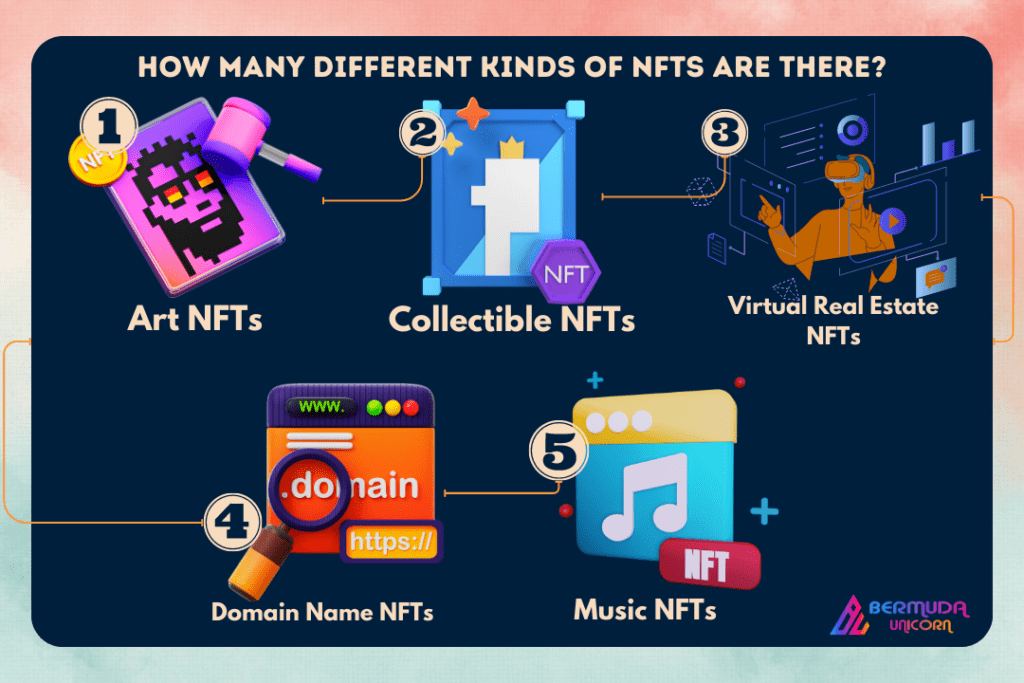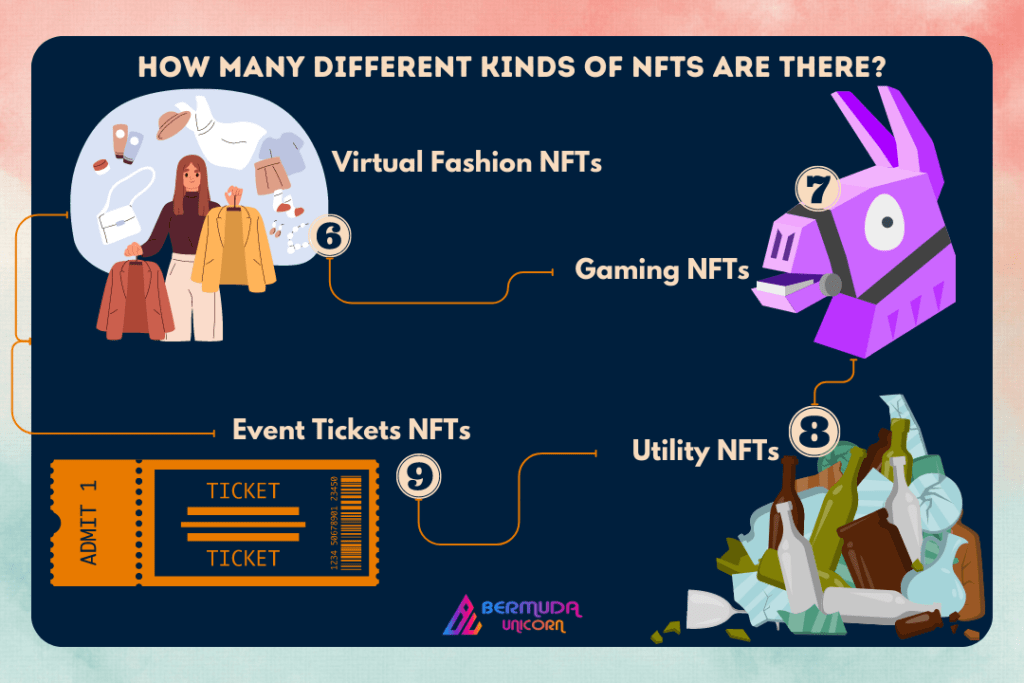![]()

Introduction
In recent years, NFTs have emerged as groundbreaking technology, transforming how we perceive ownership and value in the digital realm. These tokens represent ownership of digital assets on the blockchain, making them unique, irreplaceable, and easily verified. This has enabled artists, creators, and collectors to monetize and trade digital assets transparently. NFTs have diverse applications, from virtual art and music to virtual real estate and gaming items.
Let’s explore the different types of NFTs in this blog.

Art NFTs
Art NFTs are the most well-known and popular category in the NFT space. They empower artists to showcase and sell digital art, proving its authenticity and uniqueness. Each Art NFT corresponds to a specific piece of artwork, creating scarcity and exclusivity for collectors. This innovation democratizes the art world, allowing artists to reach a global audience without intermediaries while retaining control over their creations. The NFT market for digital art has witnessed explosive growth, with some artworks selling for millions of dollars, giving digital artists worldwide recognition. Lets move to some other types of NFTs.
Collectible NFTs
Collectible NFTs, also known as Crypto Collectibles, have introduced digital trading cards and collectible items to the blockchain era. These NFTs are commonly found in blockchain-based games or virtual worlds, where players can acquire, trade, and display them as virtual assets. Each collectible NFT represents a unique character, item, or card, and their value often increases based on their rarity and demand within the community. One of the earliest NFT projects, CryptoKitties, serves as a prime example of this category, allowing users to breed and trade virtual cats on the blockchain.
Virtual Real Estate NFTs
Virtual Real Estate NFTs enable users to own, develop, and profit from virtual properties in blockchain-based virtual worlds or metaverses. These properties include virtual land, buildings, and assets. With the rising popularity of the metaverse concept, there is an increasing demand for virtual real estate NFTs. Users can create exclusive and immersive experiences within these virtual spaces, attracting visitors and generating revenue through virtual businesses and events.
Domain Name NFTs
Domain Name NFTs merge blockchain technology with domain registration and ownership. Tokenizing domain names on the blockchain allows individuals to establish ownership of valuable digital real estate in a decentralized manner. These NFTs offer added security and transparency, minimizing the risk of domain theft and unauthorized transfers. Additionally, they create new possibilities for domain name speculation and investment.
Music NFTs
NFTs have made a significant impact on the music industry. Music NFTs empower musicians and artists by offering a new revenue stream and greater control over their work. These tokens represent ownership of specific tracks, albums, or concert tickets, ensuring fair compensation for artists. Moreover, NFTs enable direct engagement with fans, creating unique experiences and incentives like exclusive content or limited edition merchandise for NFT holders.

Virtual Fashion NFTs
Virtual Fashion NFTs are revolutionizing the fashion industry, granting users ownership and display rights for digital fashion items. These items find applications in virtual worlds, online games, and social media platforms, opening doors for designers and fashion enthusiasts. Moreover, virtual fashion NFTs promote sustainability by minimizing physical production and waste associated with traditional garments. As the concept gains popularity, we may see renowned fashion designers collaborating with virtual worlds, blurring the boundaries between physical and digital fashion.
Gaming NFTs
Gaming NFTs have brought a revolution to the gaming industry by enabling true ownership of in-game assets and characters. In traditional gaming, players invest time and real money to acquire virtual items, which remain trapped within the game’s ecosystem. NFTs change this paradigm by allowing players to buy, sell, and trade virtual items outside of the game, enriching gaming experiences. Additionally, NFTs introduce the “play-to-earn” concept, enabling gamers to earn income by engaging in specific blockchain-based games. This innovation opens up exciting possibilities for gamers and represents a major shift in the gaming landscape.
Utility NFTs
Utility NFTs are special tokens that work in blockchain systems. They are different from regular NFTs like art or collectibles because they offer practical uses. These tokens can give you access to exclusive groups, unlock special content, or give you special advantages. Utility NFTs make blockchain technology more useful in the real world by providing actual benefits and services. This makes NFTs more valuable and useful in different industries.
Event Tickets NFTs
Event Tickets and NFTs make ticketing systems better. Instead of traditional paper tickets, event organizers use NFTs for tickets. This brings more efficiency and security to the process. NFTs help reduce fraud and scalping because they are unique and cannot be duplicated. All ticket transactions are recorded on the blockchain, making them traceable and transparent.
NFTs also allow ticket ownership to be easily transferred from one person to another. This creates a secondary market for event tickets, where people can buy and sell tickets based on supply and demand. So, ticket prices become more fair and determined by how many people want to attend the event. Overall, Event Ticket NFTs improve the ticketing experience for both organizers and attendees. These are almost every different types of NFTs.
Conclusion
The different types of NFTs is continually expanding as developers and creators explore new applications for these blockchain-based tokens. NFTs have disrupted multiple industries, from art and gaming to music and fashion, creating new opportunities and challenges for artists, collectors, and entrepreneurs. However, as with any emerging technology, it’s essential to exercise caution and conduct thorough research before investing in NFTs, as the market can be volatile and subject to rapid changes. Nevertheless, the potential of NFTs to redefine ownership, creativity, and commerce in the digital age remains an exciting prospect for the future. As blockchain technology continues to evolve, we can expect to see even more innovative use cases for NFTs, enhancing the digital landscape and empowering creators and collectors alike.
